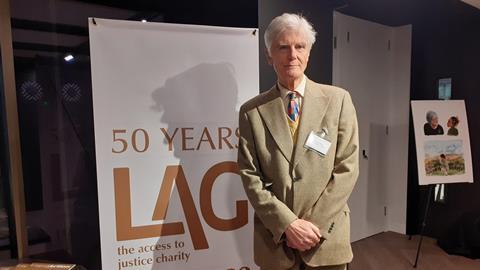Legal Action Group, 50 this year, comprises a ‘small body of people doing a hell of a job’. But the communitarian spirit that gave rise to such organisations is long gone, making its job much harder now
On the day that all Covid restrictions were lifted in England, Legal Action Group (LAG) celebrated its 50th birthday with a small group of friends. And who better to reflect on the past 50 years than Andrew Phillips (Baron Phillips of Sudbury), one of the four lawyers who called the meeting that led to the creation of LAG.
‘Fifty years is a long time, yet in many ways it seems like yesterday,’ he told the gathering, which included former Supreme Court president Lady Hale. Back then the Society of Labour Lawyers had published a booklet, Justice for All, ‘which contained you could have thought ideas written yesterday’. Some of the people who worked on that booklet kept in touch. ‘Why on earth do we not set up a charity committed to trying to deliver what the report says is in need of being delivered?’, Phillips suggested.
A year later, LAG was born.
LAG’s vision is for ‘a fair legal system that excludes no one, upholds equality and social justice, and meets the needs of the people it serves’. It has its work cut out – perhaps more so now than it did 50 years ago.
Phillips said: ‘I think, and suspect you think, that at this moment in time, there is a profound crisis in the provision of law services to poorer people and that LAG can and should step up and step in.
‘We won the war through common purpose, through a world where if you were poor you were offering to lay down your life as if you were money-rich. Values and sentiments came out of that war. “We’re all in this together.” Does anyone say that now? But we were all in it together. In the field of battle, the officer was offering no more than the private – namely his or her life. And that sense of commonality, community, of common good, motivated so much of what happened in the aftermath of the war.’
The Legal Aid and Advice Act, which received royal assent on 30 July 1949, was designed to make legal aid and advice more readily available for ‘persons of small or moderate means’.
‘Since then, there has been a sad and utterly regressive dominance of money,’ Phillips said. ‘The way money is thought of in today’s world. If you have got money you deserve the advantage and privilege that comes with it. If you have not, you’re idle. I cannot abide those sentiments.’
What LAG tried to do, and is still doing, is bring into the world justice for everyone. ‘The world I grew up in after the war, there was so much more of that,’ Phillips recalls.
‘The legal component of life in the 1950s, [towns] all had local courts, local councils, local businesses – all gone. In my home town of Sudbury, we had a magistrates’ court, a county court, a coroners’ court – all gone. We were self-governing. We’re now governed by Ipswich some 20 miles away.’
This matters because ‘justice is under massive threat and justice is the cornerstone of any decent society’, Phillips said. ‘How can justice be unequal? That’s not justice. That’s a total denial of the meaning of the word.’
LAG has been an invaluable support for people – and not just lawyers – passionate about social justice.
‘The challenge is to take the original 1970s spirit to inform, critique and lead into the 2020s,’ says LAG chief executive Sue James, who spent several years on the frontline as a law centre solicitor. ‘We have to continue to publish our books and magazines and focus on using the law as a tool for social change.’
LAG’s extraordinary catalogue of books continues to grow (thanks to the tireless efforts of publishing director Esther Pilger, who has worked at LAG since 2002). Recent titles include Defending Possession Proceedings (ninth edition) and Discrimination in Public Law.
The team is brimming with ideas for the future. A writing and social justice academy ‘to create the next generation of authors’. An archive of literature and resources, such as reports, research and regulations.
Funding is crucial. James wants to build a ‘wider portfolio’ of funders.
Phillips described LAG as a ‘small body of people doing one hell of a good job… If we get a bit more money, we can get more staff and we’re off again’. Let us hope so. Happy 50th Birthday, Legal Action Group.





































2 Readers' comments